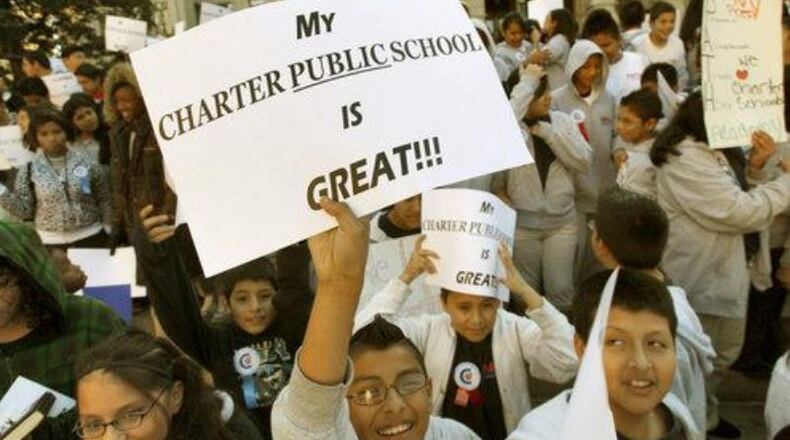Corey DeAngelis is a policy analyst at the Cato Institute's Center for Educational Freedom. In a guest column, DeAngelis endorses a bill in the Georgia Legislature that would increase state spending on charter schools.
Sponsored by Rep. Scott Hilton, R-Peachtree Corners, House Bill 787 would increase charter school investment by about $10 million. (Along with raising the per-pupil spending, the bill would add money for some school buildings in higher-cost areas and computers.)
At a recent legislative hearing, Hilton maintained the increase for charters would not take money from other public schools because it wouldn’t come out of the $9 billion state education budget. Instead, the new funds would come from the general fund.
My AJC colleague Ty Tagami reported there were still concerns about the proposed spending increase, with Rep. Howard Maxwell, R-Dallas, saying, "If we're going to increase the size of the pie, we're going to have to put more money into the making of it."
By Corey DeAngelis
Atlanta has a great education opportunity ahead, because Georgia policymakers are considering funding public schools equitably.
The new legislation, House Bill 787, would equalize public charter school funding with traditional public schools for all 180 school districts in Georgia, and would cost the state about $10 million.
The bill’s sponsor, Rep. Scott Hilton, says that the price tag is a “drop in the bucket,” especially since charter school students are currently being educated “on the cheap.”
He has a point. Research shows charter schools can achieve the same outcomes or even better than traditional public schools, and for less money, too. It’s exciting to think about how successful these schools would be if they received just as much funding as their traditional counterparts.
As shown in a recent study by my colleagues at the University of Arkansas and me, Atlanta public charter schools receive around $2,000 less funding allocated on a per-child basis than their district school counterparts each year, or almost $26,000 less throughout a full K-12 education. And we find that despite the large funding disadvantage, Atlanta public charter schools are 14 percent more cost-effective and produce an 18 percent higher return-on-investment than their neighboring district schools.
Let’s make this a bit more concrete. The data show that every thousand dollars spent on education in Atlanta district schools translates to around a $4,560 increase in students’ lifetime earnings. That is commendable. But that same thousand-dollar-expenditure produces an estimated $5,370 in students’ lifetime earnings if allocated to a public charter school in the city. And that 18 percent advantage is very important considering that Atlanta taxpayers spend over $210,000 for each child’s K-12 education in district schools.
In other words, 13 years of equal funding in charter schools could produce around an additional $170,000 in lifetime earnings for each charter school student in Atlanta.
Of course, this isn’t the only study finding that charter schools do more with less. In 2014, researchers at the University of Arkansas also found that charter schools across the country were 40 percent more productive, as measured by gains in student achievement, than neighboring district schools. In addition, experimental studies by researchers at Harvard University and Princeton University found that male students that won a public charter school lottery were less than half as likely to commit crimes later on in life, and female students were 59 percent less likely to become pregnant as teenagers.
And positive effects like these pay off. When charter schools reduce the likelihood that students commit crimes as adults, society spends less resources on policing, court cases, corrections programs, and prisons.
Overall, the scientific evidence suggests that charter schools improve academic outcomes for students. Researchers from the University of California San Diego recently completed the most comprehensive review of the evidence on charter schools to date. The review concluded that, on average, charter schools helped students achieve the equivalent of over a month of additional learning in math, relative to their peers in district schools. Three experimental evaluations also find that winning a random lottery to go to a charter school increases students’ chances of attending college. For example, an experiment published in the Journal of Labor Economics found that children that won a charter school lottery in Boston were 13 percentage points more likely to enroll in a four-year college.
It’s about time the thousands of children in Atlanta public charter schools get the educational resources they deserve.
The data show that Atlanta charter schools do more with less, helping children to get good educations in spite of a lack of funding parity. Let’s see what they can do with the same resources. Any individual investor would know what decision to make in this situation. Policymakers in the state should treat Atlanta taxpayer money as if it were their own – and invest wisely.
About the Author
Keep Reading
The Latest
Featured



